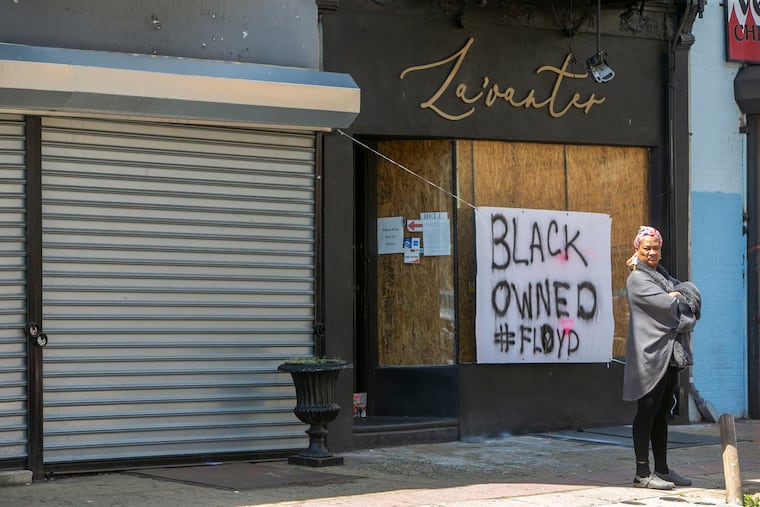
When we see words like “social unrest,” or news reports focusing on looting, riots, and related actions of violence, we see communities in pain — crying out for healing.
We’re both African Americans who lived through the civil rights era. One of us is a criminal defense and civil rights attorney in private practice who has fought for the accused for decades. The other is a longtime pastor, nonprofit executive, and community activist.
The destruction prompted by the murders of George Floyd and Walter Wallace Jr. brought us together to seek a solution that could lift the community from a place of harm toward a place of wholeness. We collaborated with others to give birth to Philadelphia’s first adult restorative justice model. Restorative justice is an approach that dates back centuries in which the harmed individuals, the accused, and the affected community come together to determine the remedy for the offense.
In African Bantu cultures, the concept is informed by a phrase that literally means that “a person is a person through other people.” Today the term is reflected in the phrase known as ubuntu, which means “together we are.”
It was from this spirit of shared accountability that we pursued this time-tested approach. The current criminal legal system is built to punish those who get caught within its web. We know that this system disempowers Black and brown communities, interrupts restoration, and blocks social opportunities for healing.
During that summer of unrest in 2020 in Philadelphia, some 700 people were arrested for various crimes. Of those arrested, a significant majority had no prior record. Further, like most individuals accused of a crime, many have multiple needs (income and housing insecurity, a lack of mental health treatment, inadequate education) that the criminal legal system simply is not designed to address.
The current system often churns out criminal cases with racially disparate sentencing results that materially affect individuals with criminal records for the rest of their lives. It deprives them of some of society’s most basic privileges such as obtaining a driver’s license, maintaining stable housing, securing public assistance, or keeping a steady job. Restorative justice practices can offer an alternative.
We used our respective knowledge of the existing system to advocate for the District Attorney’s Office and the community to follow a different path. The Restorative Response Program was successful in that it resolved the majority of these protest-related cases and swiftly moved them out of the criminal legal system and back into the harmed communities for resolution through education, discussion, and reconciliation. This was all done without court intervention and without the participants having a criminal record as a result of their arrests. Community members and lawyers are looking to expand this program into other types of criminal cases.
Those arrested in relation to the two periods of civil unrest, and who acknowledged their participation in causing harm, were represented by the Philadelphia public defender’s office, who met with prosecutors to reach an agreement on who would be eligible for placement into the Restorative Response Program. No approval was necessary from the courts except for ultimately agreeing to dispose of these cases once the person arrested successfully completed the program.
This restorative response began with an education session — initially held virtually and then in person — that introduced participants to the principles of restorative justice. Participants who completed the orientation were offered two choices: 1) complete volunteer service hours at local nonprofits, or 2) participate in restorative justice circles with people harmed by the unrest, including business owners.
Of the hundreds of people arrested, 330 accepted the invitation to participate in the restorative justice program, and 63 completed the justice circles, resulting in 58 individuals who have had the charges against them dropped and their records expunged. Only five people who participated in the program have committed any crime since.
But numbers alone don’t tell the full story. Relationships were formed. A shared respect for the community was uncovered. A different understanding of justice was embraced.
» READ MORE: The Philadelphia Prison Advisory Board is a farce
The door remains open to those who qualify for this approach in relation to offenses committed during the unrest. The Metropolitan Christian Council of Philadelphia (MCCP) has established 12 restorative justice hubs in communities throughout the city staffed by volunteers who have been trained in restorative practices.
Restorative justice is a collaborative community empowerment program that is designed to divert individuals out of the criminal legal system. We hope that the continued success of restorative justice programs will supplant the current way that criminal cases are processed and resolved. In the end, any approach that seeks solutions from within can help ensure that our city remains intact, strong, and whole.
Troy H. Wilson is a criminal defense and civil rights attorney practicing in Philadelphia. The Rev. Dr. Donna L. Jones is a Philadelphia-based pastor and the executive director of the Metropolitan Christian Council of Philadelphia (MCCP).